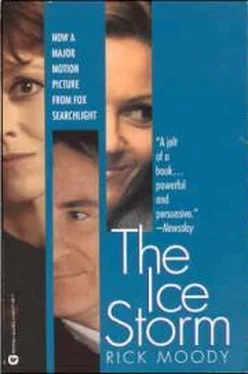* * *
MORE OF SAME — or worse. That was the weather report. The mercury would retreat into its little bulb. The heavens would open. Elena foresaw glazed and treacherous roads. Ski jackets with fur fringe. Hats with pom-poms. And this wasn’t all bad. Any excuse to avoid the Halfords’ party was a blessing. She was in the library. Cross-legged on the sofa. Her home was silent as a library. Reading was a brave spiritual journey for Elena Hood, and little piles of books were for her like the stacks of rubble — the Tibetan prayer walls — that marked the progress of pilgrims. There was a warm force field, an invincibility, around her in the midst of this reading journey, no matter how conventional it was by 1973, no matter how trammeled, shopworn. She cherished the I Ching and the tarot deck, though she told no one in the suburbs; she believed her decisions were mapped by unseen cartographers. She purchased books from the occult and religious studies sections according to their spines, or if she overheard talk about a title, or if it was advertised in Psychology Today.
In her library, in firelight, she read, in silence. Her hair was frosted blond. Her glasses were thick, but she wore them only for reading. The rest of the time she squinted.
She wore amber wool slacks and a wool sweater she had knitted for herself and Hush Puppies. Elena was always cold. Her college textbooks were relegated to a low, dusty corner of the shelves, below the Book-of-the-Month Club selections — glossy, hardcover editions of current fiction that she ordered for her husband, who neglected them.
She was reading about impotence in older men. She had opened Masters and Johnson, Human Sexual Response, to the very page. According to the experts, the chief cause for the diminishment of intercourse in middle-aged couples was a single incident of impotence. This initial crisis, whether caused by the traditional drinking — provokes desire but affects performance — or by anxiety or other mental factors, so frightened men that thereafter they frequently inclined toward celibacy. In their indignity and remorse, they claimed to be uninterested.
The very page she turned to. She enjoyed Masters and Johnson. Much better than Havelock Ellis, the grandfather of sexual studies, who was big on examples from country life — hairpins removed from teenaged girls’ vaginas, accounts of couples unable to uncouple afterward-but short on the pathos of unhappy marriages. Much better than Kinsey, that precursor, with his quaint, polite view of sexuality — mouth-genital contact may not be, after all, a strictly homosexual practice — or Krafft-Ebing’s monumental Psychopathia Sexualis: the hallucinatory and dangerous cousin to Reich’s Function of the Orgasm.
There were some sensational pictures in here. Like the diagram of the penis, scrotum, anus, and prostate. All neatly inked in. The prostate intrigued her-that little walnut the urologist was always wringing out. Men sheltered it away. So much, in the end, was done in deference to the prostate. When it strangled off the urethra in older men, it struck the famous and unknown with the equanimity of a plague. They all stood shaking out meager drops at the urinal.
And there were graphs, too, graphs that rendered, in seconds, the likelihood of nipple-stiffening and muscle-shuddering and labia-moistening. This was up-to-the-minute stuff. For example: in New Canaan, suddenly, women were familiar with the term labia. They had strong opinions on the vaginal orgasm. She could recall any number of recent afternoons when she had overheard Dot Hal-ford and Denise Blackmun — or somebody — trading theories over a glass of carrot juice: Dot, I’m aware of how the clitoris functions when I climax, but I’m fust not sure, when he’s wombing me, that my vagina has a role in it. I’m just not sure. Anxiety etched in their faces.
Elena and her husband were not truly middle-aged. They hadn’t sagged that far yet, but they had experienced the initial trauma of impotence. They had felt its clean incision. Both of them. Yes, she had felt it, too: “The inhibitions of the upper-level female,” as the experts had it, “are more extreme than those of the average male.” It was something like eighteen months. Eighteen months since then.
Whether Ben’s drinking had brought on his impotence, which had in turn brought on the drought in their connubial relations, she couldn’t say. But when she saw his penis now, as he showered or dressed for work, she felt no more for it than she felt for any plucked and headless game bird. It was a quaint reminder of another time, an antique, a curio. A reminder of Ike’s stroke or the Berlin crisis. And the worst thing about it was she felt the same way about herself. The fertile spot in her, the mandala in her belly was shut down, stored away.
The way she saw it, the drought led straight to Benjamin’s unfaithfulness. Masters and Johnson had no good advice here. The plain facts hadn’t dawned on Elena suddenly. There had been no painful encounter with evidence — stained shorts or lipsricked collars or perfumed envelopes. It just struck her at a party one night — a party was the natural place to learn these things — that this was the logical next step for him. This was the narrow channel at which they had arrived.
So there they were, Janey Williams and Benjamin, at this party, sunken into a couch without any kind of back support. Buried in throw pillows. Janey Williams, miserable, desperate Janey, whose husband no longer comforted her. There they were, Benjie and Janey. Getting sloppier as they moved toward one another. Their expressions were mournful, their drinks were frequently empty. They inched around each other like porcupines, closing in for warmth, then stabbing one another and moving off.
The idea of betrayal was in the air. The Summer of Love had migrated, in its drug-resistant strain, to the Connecticut suburbs about five years after its initial introduction. About the time America learned about the White House taping system. It was laced with some bad stuff. The commodity being traded was wives, the Janey Williamses of New Canaan. The payoff was supposed to be joy, but it was the cheapest approximation of exalted feeling. It was just a demonstration of options, nothing more. From her meditative position on the couch, in her unflattering slacks and Hush Puppies, Elena felt she could judge the motives of New Canaan, Connecticut. Because she had permitted her own options to dwindle. Time sputtered and nickered and consumed the comedy of her efforts.
Elena read. She roused herself now and then. For dinner: Green Giant frozen peas in butter sauce, leftover stuffing, and leftover turkey. This parsimonious and homely table awaited her husband and daughter.
It was monks who first taught the art of reading in silence. During the Dark Ages. Augustine, perhaps, was first. And silence was a tongue Elena understood. Silence was her idiom for support and caring. Silence was permissive and contemplative and nonconfrontational and there was melody to it. It was both earth and ether. When Paul hinted that he had been experimenting with drugs, Elena said nothing. When Wendy boasted of her first period, Elena said nothing. Later she placed on her daughter’s pillow the box of Kotex, with the instruction circular removed and placed carefully beside it. Silence suited the complexities of these passages — the initiation in yaje, and in the lunar calendar. If you were an American Indian, you went off into the bush and hallucinated on your own. And if you were a Druid girl, a marriage would be prepared for you, and this very effluent would be a condiment at your feast. We would drink your menstrual blood, and later, eat your placenta.
Читать дальше












